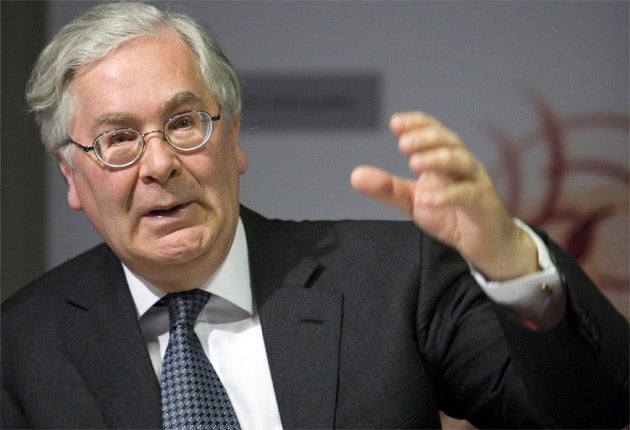The gathering storm: Britain's faltering economy

High inflation. Slow growth. Falling house prices. Rising unemployment. Banks that remain broken. Confidence shredded.
Almost precisely three years after a financial crisis with its genesis on Wall Street and in the City of London mutated into the worst slump since the 1930s, the British economy seems set to suffer the worst of all economic worlds, a lethal combination that means life will be far from normal for many years. Indeed, conditions will be made more difficult by the harshest public spending cuts since the Second World War, however necessary they may be judged to be.
The Governor of the Bank of England, Mervyn King, warned yesterday that bank lending, the public finances and the economy as a whole will take many years to return to pre-crisis levels. He confirmed that inflation would be higher next year than previously feared, and growth in the economy slower. The upturn will be "slow and sluggish", he added; things would be "choppy".
Business and consumer surveys clearly show that the emergency Budget led to an immediate loss of confidence among households and companies, which almost certainly led to lower sales on the high street and a further slump in investment.
One of the many injustices of the crisis is the way that a recession caused by London and Manhattan bankers unleashed its havoc upon blameless firms and families across industries in the North, the Midlands and Wales, destroying livelihoods. Now, still reeling from the closures, the sackings and the repossessions, these same regions, many of which have relied on government jobs to sustain them, are threatened with savage Budget cuts. In many parts of the country, and for many thousands of families, the recession is far from over: "Double dip" may not do it justice.
The Bank's warnings add to signs that the UK will soon suffer from the worst of all worlds on almost every main economic indicator – high unemployment coupled with inflation; depressed growth and house prices; and a widening divergence between the better-off regions and those, such as the Midlands, which have been hit hardest in the downturn. Public spending cuts threaten to throttle revivals in industrial centres such as Coventry and Newcastle, where government agencies and schemes also provide many jobs.
So while the whole nation will suffer a squeeze in its living standards over the next 12 months – thanks to minimal wage rises, tax hikes and soaring food and petrol prices – the most disadvantaged households in the most distressed regions are set to suffer the greatest pain. And, even though the latest figures on unemployment show a stabilising total just shy of 2.5 million, an additional 1.5 million are in temporary or part-time work because they cannot find a full-time job. The numbers of long-term unemployed are also up sharply; 796,000 Britons have been without work for more than a year, and 313,000 for over two years. Many economists believe that a headline figure of 3 million jobless next year is a growing possibility.
Inflation, says the Bank , will remain above the official target for the whole of 2011, with an outside chance that it will spike as high as 5 per cent. Recent sharp rises in the price of foodstuffs and other commodities, including a doubling in wheat in two months, and the rise in VAT threatens a sharp spike in the prices households pay for everyday items such as petrol and bread. Again, poorer families will be the most disadvantaged, especially if they rely on housing benefit or disability allowances, soon to be reformed.
But that relatively high inflation rate – which promises to be the worst among the advanced G7 economies – will be combined with growth of about 3 per cent over the next two years or so, rather than the 3.5 per cent previously estimated by the Bank. That is markedly more optimistic than official projections from the Office for Budget Responsibility for growth of 2.3 per cent in 2011, or the IMF, which sees the UK growing by a slow 2.1 per cent next year. According to the range of forecasts the Bank produces there is a chance that the economy will experience negative annual growth in the middle of next year.
Yesterday Mr King was keen to stress that the risk of a Greek-style sovereign debt crisis had been eased by the Budget, and with it the extremely damaging possibility of a sky-high rise in interest rates. But the internal dangers to the economy, even before the Chancellor takes £113bn out of the economy and 600,000 public-sector jobs with it, seem scarcely less real.
Subscribe to Independent Premium to bookmark this article
Want to bookmark your favourite articles and stories to read or reference later? Start your Independent Premium subscription today.

Join our commenting forum
Join thought-provoking conversations, follow other Independent readers and see their replies